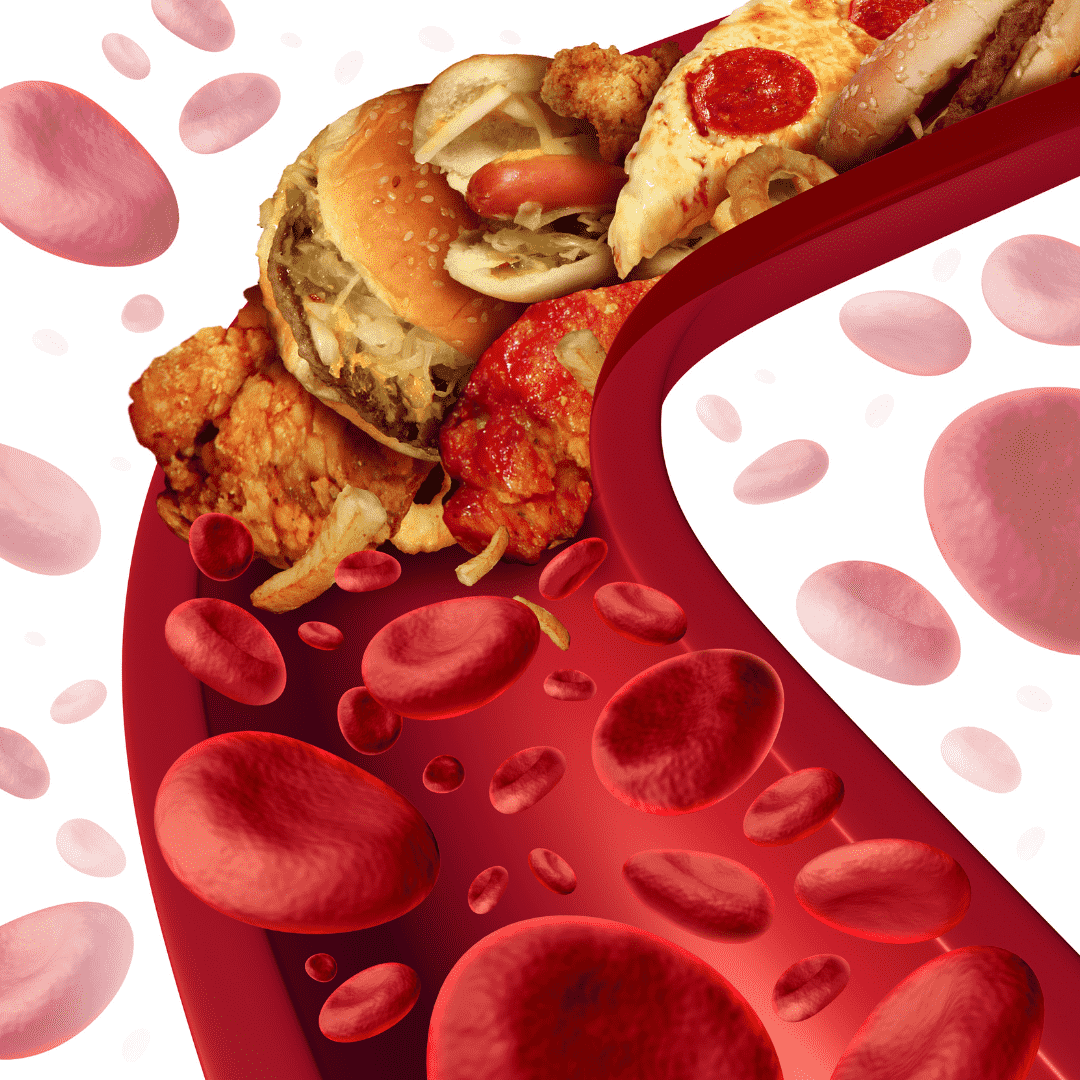Cardiovascular disease is the #1 killer in the world so the spotlight shines on heart health this month, with a particular focus on cardiovascular well-being. Central to this discussion is the topic of cholesterol. While much attention from both media and medical professionals revolves around the perils of high cholesterol, painting it as a villainous substance with dire consequences for the heart, is it truly deserving of such infamy? Let’s delve deeper into the realities of cholesterol’s effects on the body and explore the effects of too much and the less discussed topic of too little cholesterol!
People talk about their cholesterol and even use it as a metric for whether or not they are healthy. However, “cholesterol” doesn’t cause cardiovascular disease. Cholesterol is actually an essential substance for your health. It is the backbone of sex hormones (testosterone, estrogen, progesterone, aldosterone, cortisol, etc), Vitamin D, bile, myelinated structures of the brain and central nervous system, and cell membrane fluidity. It’s a key component of all tens of trillions of cell membranes in your body. You MUST have cholesterol. If your body senses it doesn’t have enough cholesterol, the liver will produce it. It’s no wonder low cholesterol as we age increases the risk of many diseases and death itself.
In fact, low cholesterol is an excellent predictor of earlier death in seniors and the elderly. With more than 200 million people worldwide on cholesterol-lowering medication we have a lot of people that may be overly suppressing their cholesterol production!
One study found that seniors (age 65 or older) with total cholesterol in the lowest quartile had more than twice the risk of death of those in the highest quartile. This was true even when the data was adjusted to reflect an array of chronic diseases including Type 2 diabetes, hypertension, and existing cardiovascular disease. The study found that total cholesterol levels below 189 increased the risk of death!
Another study of over 100,000 people found that low cholesterol was predictive of mortality with statistical significance in both women and men from age 50 and older. In particular, this included death from cancer, liver disease, and mental illnesses. A more recent study of those 80 years of age and older has shown the same result.
The risk of infections that require hospitalization is also inversely related to total cholesterol. This makes sense as LDL is a key component of the immune system. Another study found a 1500% (that’s 15X!!!) higher risk of developing cancer in those individuals with LDL cholesterol below 70.
As far as high cholesterol is concerned, protecting ourselves from heart disease is largely about keeping our bodies free from chronic inflammation – and thus our arteries largely un-inflamed and not attracting an immune system reaction or the build-up of plaque. If inflammation is kept down and arteries are healthy a person can have relatively high levels of LDL cholesterol, supported with ample HDL levels as well, with no issues.
It is inflammation that makes arteries “sticky”. Sugar, refined carbs and processed vegetable oils are the biggest villain here, scraping at the inside of arteries and the body in its wisdom lays down plaque to repair it.

Everyone is unique of course, and I take a look at their bio-individuality. LDL and HDL are neither inherently “good” nor “bad”. There is a big “it depends” here for each unique individual as well as the “quality” of LDL cholesterol.
What do we want to consider when markers in your lipid panel are high?
The first thing we need to do is ask “why?” Why are your cholesterol markers high? Depending on each individual, the reason “why” is unique. Here are a couple reasons why makers in a lipid panel might be elevated:
- Elevated triglycerides with low HDL is often seen with insulin resistance. Aiming to get triglycerides a bit under 100 mg/dl and HDL a bit above 60 mg/dl helps to reduce the cardiovascular risk. So how do we get healthier triglyceride levels? By addressing insulin resistance which includes managing blood sugar through a healthier diet, getting you moving and exercising, working on better quality sleep and helping you to manage stress better. Increasing HDL benefits from the same approach, and also needs increased exercise and the intake of healthy fats for notable improvements.
- Elevated LDL in women specifically can often be indicative of a hypothyroid function. In fact, the American Thyroid Association suggested treating hypothyroidism as a way to lower LDL in many cases. To rule this in or out, work with your physician to run a full thyroid panel including Free T4, Free T3, Reverse T3, TPO antibodies and TG antibodies so you can get a fuller picture of what is going on with your thyroid function. From there you can better discern whether or not a hypothyroid dynamic is at play and may need some support.
Merely examining individual markers isn’t enough. It’s crucial to delve deeper and analyze patterns within the lab results. Over the past decade, scientific advancements have highlighted the significance of LDL particle count and size, as well as the Triglycerides:HDL ratio (vs. just the total amount measured of LDL-C, the typical “bad” lipid). Taking this analysis further, an NMR lipid profile, which assesses LDL particle count and size, offers an even more precise indicator of atherosclerosis and heart health.
Cholesterol is far more complex than simply labeling it as “good or bad,” with numerous nuances beyond what I’ve covered in this blog. The key takeaway is that lower cholesterol isn’t always synonymous with better heart health or hormone health. Just as every individual’s health needs are unique, so is their cholesterol profile. Effectively managing healthy cholesterol levels involves a holistic approach, including maintaining a balanced diet, staying hydrated, reducing inflammation and physiologic stressors, stabilizing blood sugar levels, supporting liver and digestive function, considering targeted supplementation where appropriate, managing stress, and ensuring optimal sleep. In many cases medications can be life-saving interventions but they can also potentially be disease-worsening defaults by forcing the lowering of numbers without addressing the true root causes of the dysfunction that exists. Know your numbers and what is causing them to be elevated so you can take empowered steps to better health and wellbeing.

Written by Sue Rapley
More From This Category

Tightness, Tension, Spasm… Oh My!
Tightness, tension, spasm… Throughout the body, these symptoms are often a sign of insufficient magnesium. Roughly 65 percent of people admitted to the intensive care unit — and about 15 percent of the general population — have magnesium deficiency.

Hydrating Is More Than Chugging Water
Hydration isn’t just about guzzling plenty of H2O. The key to effective hydration lies in understanding the role of electrolytes in ensuring the water you are drinking actually gets into your cells.

Ginger Ale Myths Unveiled: The Stomach’s True Friend
Discover the real magic of ginger for your stomach as we debunk ginger ale myths and explore the soothing benefits of this natural wonder. From easing nausea to calming inflammation, ginger’s potential is far more potent than its sugary carbonated counterpart.

